Meet our new faculty and staff
The VCU School of Social Work has seven faculty who started their first full academic year with the school in August 2022. They include three teaching faculty who joined in the spring and one of whom is now director of field education; and four tenure-track faculty with a focus on research.
Adrienne Baldwin-White, Ph.D.
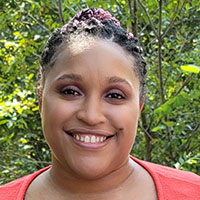
Assistant professor
Position before joining VCUSSW
University of Georgia School of Social Work, assistant professor
Research focus
My research focuses on gender-based violence prevention; specifically the integration of technology into prevention and intervention programming.
Why VCU?
I wanted to join VCU because my work is really focused on making a community impact. I knew being at VCU would provide the support I needed to make community partnerships, and create programming that makes a real community impact.
What experiences are you excited to bring to and share with VCUSSW?
I am very excited to share how I have integrated technology into program development by creating an online training for police officers, a video game and a smartphone app.
Qasarah Bey Spencer, Ed.D.
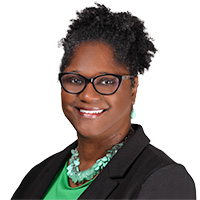
Assistant professor in teaching
Previous experience as VCUSSW community-embedded (adjunct) faculty member
2018 – April 2022 and field instructor since 2010
Position before joining VCUSSW
Lower School administrator, Anna Julia Cooper School, Richmond
What experiences are you excited to bring to and share with VCUSSW?
As a macro practitioner, my experience centers on asset-based community development in marginalized communities; equity and social justice in public and private education; and community education regarding race and social justice. This knowledge contributes to my awareness that my engagement with students in the classroom and the field is only a part of their learning journey and professional development. I hope to cultivate a comfort level in students for ambiguity and life-long learning.
My experiences as a working professional give me a perspective of social work practice that is broader than the traditional idea of social work. I hope I can continue to help students see more possibilities for their own career pathways.
What are your areas of interest and your teaching style?
My areas of interest include social and emotional learning, educational equity, scholarship of learning and teaching in higher education, transformative teaching pedagogy, and inclusive teaching pedagogy. While I don’t have to research or publish, I would like to research and publish in these areas.
My teaching and learning philosophy is grounded in transformative/liberative, critical and relational frameworks. I find students benefit from assignments that help them connect their real-world experiences with course content and research in relevant and tangible ways. Assignments that foster student efficacy and critical thinking can move students beyond getting all the “right” answers into the space of academic risk-taking, confidence and competence.
Cassie DeSena-Jacobs, D.S.W., LCSW
Assistant professor in teaching
Previous experience as VCUSSW community-embedded (adjunct) faculty member
Since August 2019
Position before joining VCUSSW
I have been in private practice for the last 6 years. Two years ago, at the beginning of COVID-19, I opened my own trauma-focused private practice that exclusively provides teletherapy. My practice primarily works with extensive trauma, as well as the LGBTQIA community, including gender-affirming work.
What experiences are you excited to bring to and share with VCUSSW?
I have experience on both micro and macro levels. As a clinical social worker, I have worked in various settings, from community social work to residential care to acute hospital work. My experience has allowed me to develop my clinical skill set and learn how to translate that skill set into different environments. It has also provided me with an opportunity to learn and practice a variety of therapeutic models. I bring my clinical experience, including stories, role plays, and case studies, into the classroom.
I have a master’s degree in nonprofit management and have held clinical supervisor and clinical director roles. I also have experience building nonprofits from the ground up, including experience in fundraising, grant writing, advocacy, policy work, legalities of nonprofits, and how to ensure a nonprofit is also financially successful. These experiences transfer into macro work and translate to my students.
What are your areas of interest and your teaching style?
My research has focused on utilizing trauma-informed models to shift high levels of suspension and expulsion in elementary schools. As part of my doctorate, I created a curriculum for elementary school staff that focused on inherent bias awareness, cultural competency, trauma-informed learning, and the importance of relationship-building in schools.
My teaching areas of interest include clinical work, trauma, and working with the LGBTQIA community. My teaching philosophy includes looking at students as my colleagues and making time for their thoughts and perspectives in the classroom. In my clinical courses, I designate time for students to have group supervision and discuss cases from their fieldwork. I bring in outside speakers and have created assignments that can go on their resumes for jobs (like a podcast assignment focused on clinical work with experts).
I ask students what they hope the course will cover and do my best to adjust to meet their needs. I recently got my doctorate, so I know what it is like to go to school during COVID-19 with a family and a job. I am empathetic to the mental, emotional and physical toll.
Mer Francis, Ph.D.
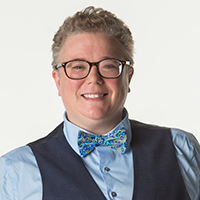
Assistant professor
Position before joining VCUSSW
Washington University (St. Louis), postdoctoral scholar
Research focus
My research focuses on how people use their social networks to build social recovery capital and recover from alcohol and substance use disorders in the context of familial substance use, genetic history, interpersonal stressors and structural traumas.
Why VCU?
The VCUSSW is the perfect place to merge my interests in teaching diverse and stellar students, continuing high-quality research, and connecting deeply with the community. In addition, the VCUSSW is such a welcoming space – I’ve felt at home here right from the very first!
What experiences are you excited to bring to and share with VCUSSW?
I’m excited to bring my 11+ years of clinical social work experience in multidisciplinary community mental and behavioral health treatment, my experience as a transdisciplinary researcher, and my community activism work into the classroom and research space! I’m also disabled and Queer / transgender non-binary, and I’m I’d love to connect with the LGBTQ+ and disability communities at our school.
Jacob Goffnett, Ph.D.
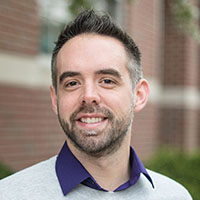
Assistant professor
Position before joining VCUSSW
University of Arkansas, Fayetteville, School of Social Work, assistant professor
Research focus
I use a transformative paradigm to explore biopsychosocial pathways to health for LGBTQ+ youth. I am particularly interested in community-engaged methods that center the voices of LGBTQ+ youth to dismantle social injustice and promote health equity.
Why VCU?
For me, learning and growth blossom through connections to other humans, so I am drawn to the School of Social Work to connect with scholars whose work has been informative to our profession and with students from various backgrounds. I look forward to strengthening my scholarship and myself.
What experiences are you excited to bring to and share with VCUSSW?
A seminal feature of my scholarship is sharing human experiences that resist the dominant societal narrative. I have 10 years of social work practice experience with youth across different systems of care and a wealth of personal experience growing up queer in rural Midwest. I am excited to share those experiences.
McKenzie N. Green, Ph.D.
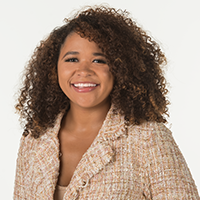
Assistant professor and iCubed scholar
Position before joining VCUSSW
National Science Foundation postdoctoral research fellow (Social, Behavioral, and Economic Services Directorate)
Research focus
My research examines how racial and familial processes intersect to impact the development and wellbeing of Black and Multiracial-Black young people. I specifically root my scholarship in critical and intersectional frameworks that highlight the heterogeneity of Black youth and family experiences, service needs and life outcomes.
Why VCU?
I was really attracted to the School of Social Work’s commitment to promoting equity and justice through community-engaged research and teaching. As a trained community psychologist, I also value the interdisciplinary nature of the school and our faculty!
What experiences are you excited to bring to and share with VCUSSW?
I am a proud alumna of VCU (B.S.’17/H&S), so I’m really excited to return to campus and to expand my program of research here. I am also eager to use my personal experiences and professional background in community psychology as a lens to assist the School of Social Work in their ongoing efforts to promote intersectional social justice and equity for marginalized groups.
Shenita Williams, Ph.D., LCSW
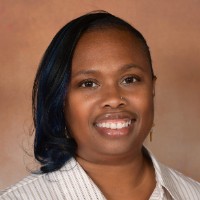
Director of field education and assistant professor in teaching
Previous experience as VCUSSW community-embedded (adjunct) faculty member
2016-2021 as both adjunct faculty and adjunct field liaison
Position before joining VCUSSW
School social worker, Henrico County Public Schools
What experiences are you excited to bring to and share with VCUSSW?
27 years of practice experience working across various settings (private practice, community-based practice, public school settings, community service boards).
Most of my experience is centered around the mental health of children and adults, particularly in the Black community. As a faculty member my practice experience and research experiences help with balancing and further enriching the faculty/staff and students
What are your areas of interest and your teaching style?
I am interested in student mental health as it relates to the support that they receive in educational settings and how educational settings meet the mental health needs of students, with an emphasis on Black students.
I consider myself an experiential teacher. I like to contextualize concepts and ideas in various ways, using in-class activities, such as visualizations, community events, etc., to ‘bring life to the concept.’ As teaching faculty, I am not required to do any research or publish. However, outside of my responsibilities, I continue to do both research and presentation at conferences and publication of articles.
New staff arrivals
- Liana Fino, B.S., senior research administrator
- Katy Martin-Poindexter, A.A.S., HR generalist
- Karen Meister, M.S., lower-level B.S.W. student success advisor
- James V. Romanik (M.B.A.'22/B), director of development
- India Turner (B.S.W., program field coordinator
- Micah Weedman, Ph.D., term prep designer